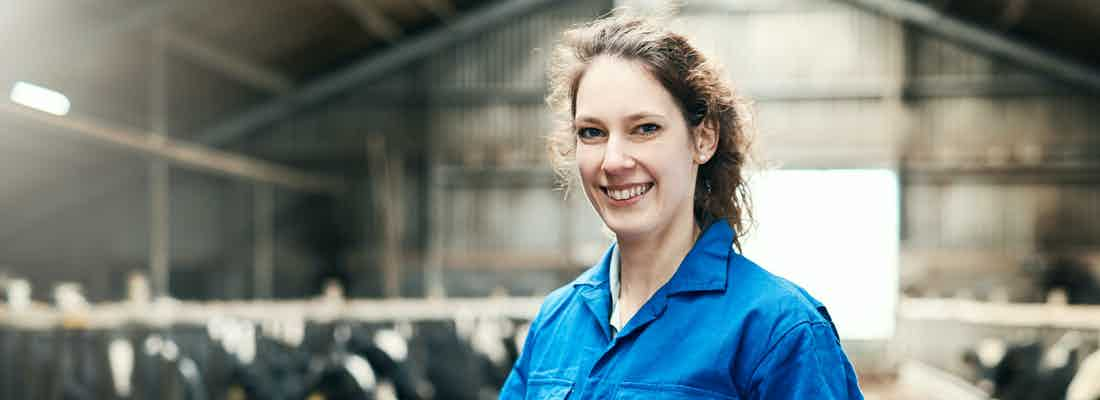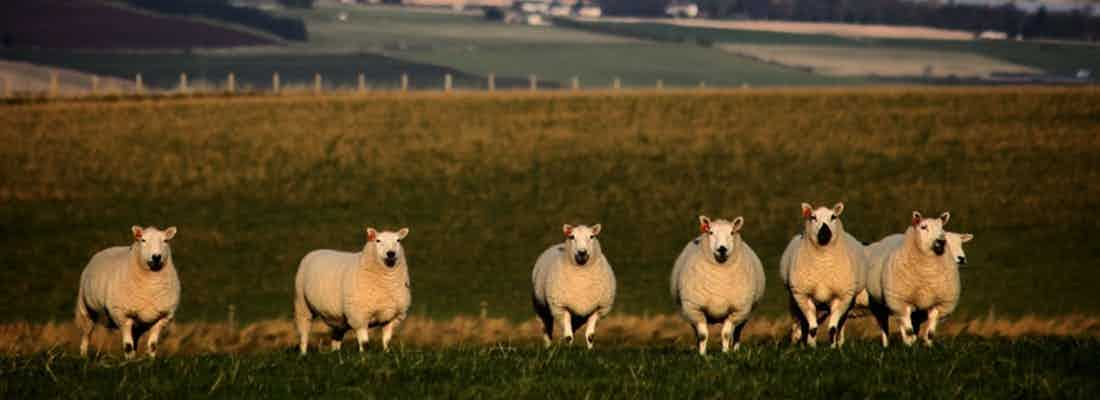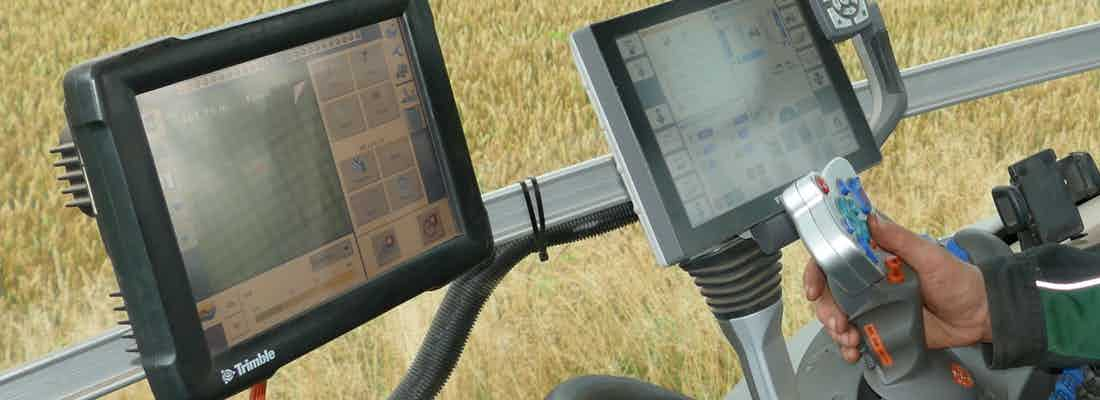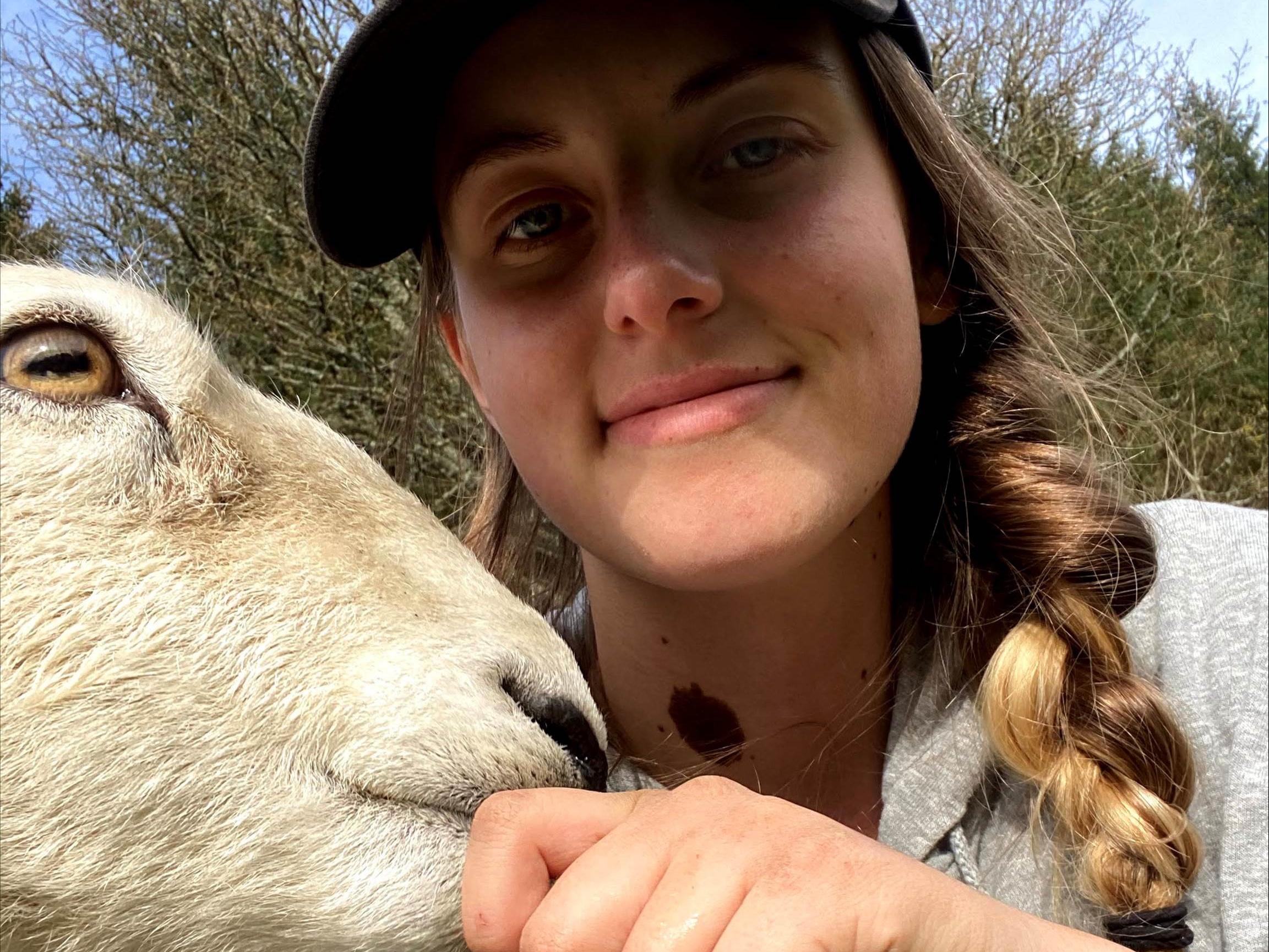
There are lots of rewarding routes into careers available across the agricultural industry.
If you're practical, like to work hard in the outdoors or have an interest in science and technology, a career in agriculture could be for you.
There's a huge demand for new staff in agriculture, and lots of different pathways into the industry. You might enjoy science and new technologies, or prefer working with animals. You might also have great communication and marketing skills. Have a look below at the types of jobs available in the public and private sector.
SVQ Agriculture SCQF Level 5
Land-based Studies Certificate
Modern Apprenticeship in Agriculture SCQF Level 6
Modern Apprenticeship in Agriculture SCQF Level 5
General Fence Installer
The fencing industry incorporates several main areas of work:
- Boundary fencing – domestic and agricultural (post and rail, post and panel, strained wire)
- Vehicle restraint - roads and motorways
- Sound proof barriers
- Parapets and bridges
- Security fencing, prisons, airports
- Electric fencing and gates.
There are around 3,150 fencing businesses throughout the UK employing 27,000 people in urban and rural areas.
Fence Installers use concrete, timber, wire, plastic and metal to install and repair fences in a wide variety of situations, from fencing off gardens on a new housing estate to putting up a high-security and acoustic sound deadening fence around an airport.
They work outdoors as part of a fencing team, usually under the direction of the Lead Installer or Foreman.
Some Fence Installers specialise in strained wire fences, electrical fencing, high security fencing, or the installation of automatic security gates and barriers.
Working Conditions
Fencing businesses can operate seven days a week, so employees usually work flexible hours based around the jobs that need completing. In larger businesses, they often work on a rota system with other staff across early mornings, evenings and weekends.
There may be opportunities for full-time and temporary work.
Fence Installers spend most of their time working outside. They may also need to collect materials or equipment and make deliveries, so usually need a full driving licence.
They are employed by large construction groups working on major building projects, by landscaping or fencing companies, and by motorway, road or rail network companies.
Many fencing contractors cover a wide area so often need to travel or work away from home.
Anyone working on a construction site, including Fence Installers, needs to have the FISS (Fencing Industry Skills Scheme) CSCS (Construction Skills Card Scheme) card.
Salary
Salaries vary with experience, qualifications and between companies, but here's a guide to what you can expect.
£20,000
£30,000
Getting started
Experience of working in the fencing or related industry is an advantage, but training is usually given. Often entry is through an apprenticeship where skills and knowledge are gained on the job.
Fencing Contractors usually advertise in local press or in trade publications or online, so this could be a good place to start your job search.
What experienced workers can do
- Maintain health and safety in the work environment
- Use and maintain tools and equipment
- Operate plant and machinery
- Prepare sites for work
- Excavate and form foundations for fencing
- Communicate with customers.
Personal qualities you should have
- Good communication skills
- Able to use initiative
- Able to work on own or in a team
- Flexible and adaptable.
Next steps
There may be opportunities to move to a Lead Installer or Foreman position, depending on individual performance, skills and knowledge and size of the business.
Industry links
Association of Fencing Industries
National Farmers Union Scotland
Scotland’s Farm Advisory Service
Fencing Lead Installer
The fencing industry covers:
- Boundary fencing – domestic and agricultural (post and rail, post and panel, strained wire)
- Vehicle restraint - roads and motorways
- Sound proof barriers
- Parapets and bridges
- Security fencing, prisons, airports
- Electric fencing and gates.
There are around 3,150 fencing businesses throughout the UK, employing 27,000 people in urban and rural areas.
Lead Installers are employed by large construction groups working on major building projects, by landscaping or fencing companies, and by motorway, road or rail network companies.
Lead Installers are responsible for:
- Managing people within the team
- Making sure work carried out meets the standards of the client
- Encouraging and motivating team members to complete task on time
- Liaising with onsite deliveries and logistics
- Managing personal and team health and safety on site.
Working Conditions
Fencing businesses can operate seven days a week, so employees often work flexible hours based around the jobs that need doing. In larger businesses, employees might well work on a rota system, including early mornings, evenings and weekends.
Lead Installers supervise a team of fence installers and labourers on site, usually working under the direction of the Assistant Site Manager or Site Manager, focusing on fence planning and installation.
They need to be comfortable working outside as well as in an office, as most of their time is spent outdoors in all weathers.
Many fencing contractors cover a wide area, travel or work away from home.
Those working on construction sites, including Lead Installers, need to have the FISS (Fencing Industry Skills Scheme) CSCS (Construction Skills Card Scheme) gold card.
A full driving licence is normally needed as well.
Salary
Salaries vary with experience, qualifications and between companies, but here's a guide to what you can expect.
£30,000
£40,000
Getting started
What experienced workers can do
- Manage and lead a team
- Plan and manage work to plans
- Able to do calculations
- Operate plant and machinery
- Excavate and form foundations for fencing
- Communicate with customers.
Personal qualities you should have
- Able to meet the physical demands of the job
- Good practical skills
- Flexible and adaptable
- Good communications skills
- Able to work on own or in a team.
Next steps
Promotion to Lead Installer is quite common for General Fence Installers, once they have supervisory skills, experience, skills, knowledge and the right skills cards.
Lead Installers can go on to become Contracts Supervisors or Managers within larger businesses.
Industry links
Association of Fencing Industries
National Farmers Union Scotland
Scotland’s Farm Advisory Service
Fencing Basic Operative Labourer
Basic Operatives work outdoors as part of a fencing team, carrying out manual tasks and helping to support qualified fence installers.
The fencing industry incorporates several main areas of work:
- Boundary fencing covering post and rail, livestock, post and panel
- Vehicle restraint covering urban and motorways
- Sound proof barriers
- Parapets and bridges
- Security fencing, prisons and wild animals
- Electric fencing and gates.
There are around 3,150 fencing businesses throughout the UK employing 27,000 people.
Job opportunities can be in urban and rural areas.
Working Conditions
Fencing businesses can operate seven days a week, so employees often work flexible hours based around the jobs that need completing. In larger businesses, they are likely to work on a rota system with other members of staff. This will include early mornings, evenings and weekends.
There may be opportunities for both full-time and temporary work.
Basic Operatives need to be comfortable working outside, as that’s where they spend most of their time. They may also need to collect materials or equipment and make deliveries, so usually need a full driving licence.
Basic Operatives are often employed by large construction groups working on major building projects. These can be motorway, road or rail network companies, landscaping or fencing companies in agriculture
Many fencing contractors work over a wide area so need to travel away from home.
Anyone working on a construction site, including Basic Operatives, will need to hold the FISS (Fencing Industry Skills Scheme) CSCS (Construction Skills Card Scheme) card.
Salary
Salaries vary with experience, qualifications and between companies, but here's a guide to what you can expect.
£15,000
£20,000
Getting started
What experienced workers can do
- Maintain health and safety
- Be able to use tools and equipment
- Be able to place and fix fencing parts
- Receive and handle fencing materials on site
- Be able to maintain working relationships.
Personal qualities you should have
- Good communication skills
- Able to use initiative
- Able to work on own or in a team.
Next steps
From a Basic Operative you may be able to progress with further training to a Fencing Installer with a large contracting businesses. You will need additional FISS CSCS cards.
Industry links
Association of Fencing Industries
National Farmers Union Scotland
Scotland’s Farm Advisory Service
Vaccinator
A Vaccinator’s role is to ensure that vaccinations can be administered to birds to prevent diseases occurring. This can be by injecting using a syringe and needle or administered by the water supply and through particle spraying.
A Vaccinator needs to be able to handle birds without causing stress, and know where and how to administer vaccines.
They may work with various ages of birds, and various types of farms and systems. This can be with breeding poultry birds, with layers producing eggs for the food chain as well as with birds bred for meat.
Working Conditions
Vaccinators will generally work at least 39 hours per week, which may be in the form of shifts. Early mornings, evenings and weekend work are all common. There are also opportunities for part-time and casual work. Most Vaccinators work inside with birds.
Salary
Salaries vary with experience, qualifications and between companies, but here's a guide to what you can expect.
£15,000
£20,000
Getting started
To work in the poultry industry you will need to like handling and working in close proximity to birds, and enjoy working in teams.
New entrants or those with less than a year’s experience in the poultry meat industry would need to attend short training courses to ensure they are trained to the minimum standard as set by the British Poultry Training Initiative.
For more information about poultry careers visit the British Poultry Council.
What experienced workers can do
- Monitor and maintain health, safety and security in the workplace
- Maintain good standards of health and safety for self and others
- Maintain environmental good practice at work
- Receive and communicate information
- Maintain and understand records
- Assist in delivering basic treatment to livestock
- Handle and restrain birds
- Maintain personal hygiene
- Maintain site biosecurity.
Personal qualities you should have
- Timekeeping
- Planning and preparation for work
- Working alone
- Attention to detail
- Safety awareness
- Flexibility.
Next steps
Most vaccinators work as specialists for independent companies which are contracted to the poultry producers.
Due to the size and structure of the poultry industry there are many opportunities to progress and move between companies.
The British Poultry Training Initiative keeps a record of all the training completed, similar to a CV, called the Poultry Passport.
Industry links
British Institute of Agricultural Consultants
National Farmers Union Scotland
Scotland’s Farm Advisory Service
Unit Manager
A Unit Manager on a farm is responsible for managing of all the sections within the unit, from breeding livestock to finishing. They may also be responsible for all of the Section Head staff members.
The type of farm will determine the kind of jobs the Unit Manager will undertake but it could include responsibility for daily tasks such as maintaining the health and welfare of livestock to preparing animals for sale or breeding.
Some farms buy in young livestock and rear them to replace their own animals, while other farms breed their own. However, the Unit Manager will be responsible for:
- Planning and setting production targets, and budgets
- Monitoring the quality of their produce and performance of the unit including health and welfare
- Managing people, recruiting for the unit, managing and mentoring staff
- Purchasing materials needed for the unit, such as animal feed
- Ensuring the unit is operating within legal guidelines
- Working with their vet to prepare and monitor health and welfare plans
- Ensuring the waste from the unit is managed correctly.
On smaller farms, Unit Managers may be involved with general tasks such as feeding livestock, driving tractors and operating and repairing machinery
Working Conditions
Unit Managers generally work at least 39 hours a week but may need to do paid overtime during busy periods. Unit Managers may be required to cover for their Section Heads if necessary and help with particular tasks on the unit.
The working conditions will depend on the farm. Some farms keep livestock like pigs indoors all year, whereas other farms with cattle will keep their animals in for the wetter part of the year but put them out to grass in the summer months.
Some farms grow crops which will need to be managed. Some farmers may do a mixture of production systems depending on their soil conditions, farm location, and the breed and ages of livestock they keep.
Salary
Salaries vary with experience, qualifications and between companies, but here's a guide to what you can expect.
£20,000
£35,000
Getting started
You should enjoy working with livestock or crops. The normal route into this career is from a General Farm Worker to an Assistant Unit Manager or straight to a Unit Manager depending on the type and size of farm.
Although there are no set requirements, most Unit Managers would have a qualification in agriculture or a related subject and several years’ practical experience.
Land-based colleges run a range of relevant full-time and part-time qualifications and courses that can be taken before or during work.
The size of a farm has a direct relation to the number of specific roles and opportunities for employees to progress. There is competition for these vacancies and movement from farm to farm to gain experience and promotion is usual.
What experienced workers can do
- Monitor and maintain the health, safety and security of the workplace
- Purchase products or services for the land-based organisation
- Promote and maintain the health and well-being of Livestock
- Establish, implement and maintain hygiene and bio-security arrangements
- Organise livestock/crop sales and purchases
- Manage a budget
- Plan what people the business needs
- Carry out and implement plans for the business.
Personal qualities you should have
- Self confidence
- Attention to detail
- Able to solve problems
- Work in a team and with others
- Flexibility
- Use own initiative.
Next steps
With the right qualifications and further experience in other farm businesses and enterprises, a Unit Manager could gain promotion to a Farm Manager, with ultimate responsibility for the unit as well as other farm enterprises.
All agricultural workers need to keep up-to-date with the latest developments in their sector. For those wishing to progress into farm management, a degree course in subjects such as agriculture or farm management may also be an option.
There may also be opportunities to work abroad.
Industry links
British Institute of Agricultural Consultants
National Farmers Union Scotland
Scotland’s Farm Advisory Service




